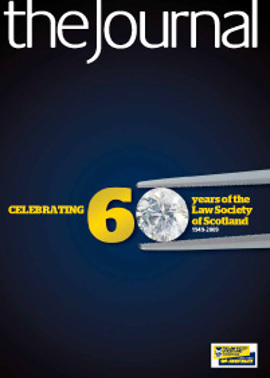Variations on a theme

England & Wales: after Myerson
This month's Court of Appeal decision will have a significant bearing on future cases
The law on financial provision in England & Wales is very different to that of Scotland and Ireland.
After a long marriage, a party who has been financially supported (fully or in part) by the other is likely to receive a joint lives periodical payment order (i.e. maintenance). At any time thereafter, provided the recipient has not remarried, either party can apply to vary and/or capitalise the maintenance.
The court’s powers to vary capital are restricted.
Under s 31(7) of the Matrimonial Causes Act 1973 (MCA), the court can vary or discharge an order for, inter alia:
- periodical payments (to spouse or child);
- payment of a lump sum by instalments;
- payment of a pension attachment order;
- a pension sharing order made before decree absolute (the final divorce order) and before it has taken effect.
Variation of capital orders
The much awaited decision from the Court of Appeal in Myerson was delivered on 1 April 2009. The couple had assets worth £25.8 million. It was agreed that the wife would receive 43%, comprising £9.5million in cash, paid over four years, and a property. The husband retained his company shareholding valued at £15 million. The shares plummeted in value by over 90%. Based on the share price at the time of the appeal, the wife stood to receive 105% of the total assets.
The husband applied to appeal out of time to set aside the original order due to a change in circumstances not foreseen when the order was made, and asked the court to order that he should transfer some shares to the wife with the lump sums being cancelled. The appeal was dismissed, Thorpe LJ noting: “When a businessman takes a speculative position in compromising his wife’s claims, why should the court subsequently relieve him of the consequences of his speculation by re-writing the bargain at his behest?”
The court highlighted that this is not the end of the story: “because the payment of the lump sum was spread over five instalments there exists, and [Mr Myerson, in a separate application] has invoked, the statutory power of variation”. If there is an order for payment of a lump sum(s) by instalments, Westbury v Sampson [2002] 1 FLR 166 sets out that not only the timing but also the quantum is capable of variation. This was confirmed by Wilson J in R v R (Lump sum repayments) [2004] 1 FLR 928.
Variation of maintenance orders
Although, historically, orders were drafted to increase maintenance annually in line with the Retail Prices Index, this is no longer best practice. There will therefore be more applications to vary maintenance orders.
When considering a variation application, the court must consider whether the payments should be brought to an end early, provided that the recipient can adjust “without undue hardship”.
Such an application follows the same procedure as an application for financial relief on divorce. This means that from the time of issuing to the first hearing there is a delay of about 14 weeks. The court sets a timetable at that hearing and considers what further information and documentation is required, and whether any valuations of assets are needed. There is then a second hearing at which the judge proactively tries to settle the case. If that fails, it is set down for final hearing. It can take 15-18 months from start to finish.
During this time, the original maintenance order stands – albeit that the payer will not usually be paying the full amount. What can the recipient do? Not a great deal. An application to enforce the original order is possible, but would be stayed once an application for a downward variation was made.
On such an application, the court must first consider the welfare of any minor children and then all the circumstances of the case, including what it had to consider when the original order was made (as set out in s 25 MCA).
Given the current climate, applications to vary maintenance are likely to be more prevalent and the outcome of (the next round of) Myerson is awaited with anticipation.
Ireland: second bite of the cherry
The Irish courts have the power, and are working out how to use it
The introduction of divorce in Ireland marked its 12th anniversary in February 2009. In that time, Ireland has moved from unprecedented economic growth with ever rising property prices, to economic and financial downturn.
The Family Law (Divorce) Act 1996 introduced wide-ranging powers to make ancillary relief orders on divorce, including the sale or transfer of property, lump sum orders, and payment of ongoing maintenance. Similar powers exist in the context of judicial separation under the Family Law Act 1995. The court has a very wide discretion, with “proper provision” constituting the test for ancillary relief. In reality, each case is determined according to its particular circumstances.
The current economic climate has seen many significant changes in how family law cases are dealt with in practice, having regard to the decreasing values of assets and resources, uncertainty of ongoing income, and the difficulty of achieving sales of properties and/or raising finance.
Power to review
A number of post-conclusion variation applications are before the courts, and some have already been determined. Section 18 of the 1995 Act and s 22 of the 1996 Act provide for the variation of orders including maintenance orders, lump sums paid by instalments, certain property adjustment orders and some pension adjustment orders. An order may be varied if the court “considers it proper to do so having regard to any change in the circumstances of the case and to any new evidence”.
Ireland is a somewhat unique jurisdiction since a “clean break” is precluded by the Constitution and the Acts, where it is stated that the majority of ancillary relief orders may be granted at the time of divorce/judicial separation “or at any time thereafter”.
During the economic boom, several “second bite of the cherry” applications were brought seeking increased or additional provision to what had been agreed on separation or divorce. The opposite may now, of course, be the case.
Before the courts
In AK v JK, High Court, 31 October 2008, Abbott J considered the powers to vary under the Acts. Drawing a distinction between “fine tuning” applications to vary on the one hand, and “strategic” applications on the other, he concluded that the test as to whether a change in circumstances ought to ground a “strategic” application should be if, “other things being equal, they were of such a fundamental nature that it would be unfair and unjust to ignore [them]”.
Abbott J returned to the issue in NF v EF, 19 December 2008, in which a house had significantly reduced in value and was proving difficult to sell. He held that, in the context of executory orders (i.e. which remain to be completed), the court retains a general jurisdiction to discharge a party from the terms of the order where performance is impossible. In these circumstances, it may be obliged to consider what alternative provision might be made to ensure the constitutional requirement of “proper provision” for all parties. Further, where circumstances have “fundamentally changed” (such as a dramatic unforeseen reduction in property prices, or the impossibility of selling a crucial asset), the court can vary the terms of an executory order, although in doing so, must retain a “balance and symmetry” with the original order. There is also an overriding criterion under the Acts that any variation would be “in the interests of justice”.
The statutory power to vary, together with the courts’ jurisdiction, may keep the door open in many circumstances and future decisions are awaited with interest.
Scotland: stuck with your lot
Prospects in Scotland are not good – unless perhaps you can take a retrospective look
So what of a Scottish Mr Myerson? Can he revisit the decision to keep shares rather than cash, as it appears he could in Ireland, and can do, in part at least, in England? In Scotland there are, of course, two different possibilities: he would have either a court order following a joint minute or contractual provisions arising from a minute of agreement. In the former case I can envisage no situation under Scots law for him to appeal late, as in the real Myerson case, on the basis of a change of circumstances that was unforeseen when the order was granted. He made his bed; now it’s time to lie in it.
But could he be better off if he were party to a minute of agreement? This is, of course, just a contract. Ordinarily, parties with capacity are free to contract as they wish. Neither can then unilaterally revisit the terms of a contract, nor will the court, if circumstances change thereafter.
There is, of course, some limited scope with “an agreement as to financial provision to be made on divorce or on dissolution”. The court has power to set aside or vary its terms where “the agreement was not fair and reasonable at the time it was entered into”: Family Law (Scotland) Act 1985, s 16(1)(b). It is clear from the authorities that the court will be slow to exercise this power. Lord Weir noted in Gillon (No 3) 1995 SLT 681, that what has to be examined is “all the relevant circumstances leading up to and prevailing at the time of the execution of the agreement”. Conventional wisdom has been that if circumstances change after the event, there is no scope for the power in s 16.
Given the dramatic changes to the economic climate in recent months, it is interesting to revisit the January 2008 decision of Sheriff Macnair in Dundee, Clarkson v Clarkson 2008 FamLR 15. Does this provide a chink of light for our Mr Myerson? Here the husband sought to set aside a minute of agreement reached in February 2007 on the basis of a common (mis)understanding that an asset had value. Both parties had independent valuations.
By July 2007 the business was liquidated. Sheriff Macnair found that “through no fault of either party both valuations proved to be false. In my view the error in the valuations renders the agreement unreasonable at the time it was entered into. This is not a case where there has been a change of circumstances since the agreement. The shares have not become worthless since the agreement; they had no value at any material date”.
So, if Mr Myerson’s shares are now worth less than at the time of the agreement, it may be worth considering when and how they came to be worth less: is it a change in circumstances after the event or might there be a Clarkson, “had no value”, s 16 argument? Your client may have nothing to lose.
In this issue
- Defining year
- At the heart of the debate
- In shape at 60
- Banks doing business
- To take us forward
- Striving after fairness
- Knowledge is protection
- The changing role of the law school
- Risk: nip it in the bud
- Close relations
- Conference keeps getting better
- Booming baby boomer
- Channel vision
- Variations on a theme
- Customer survey scores a plus
- Prepare for the upturn
- New look Society gets go-ahead
- Backing for "Wider Choice"
- Private client tax specialists recognised
- Law reform update
- From the Brussels office
- Target 2010
- Questions of our times
- Ask Ash
- Breaking the chain
- What will they do next?
- Sins of emission
- Scottish Solicitors' Discipline Tribunal
- Are we ready?
- Website review
- Book reviews
- Duty within bounds
- Change to fair
- Home reports update






